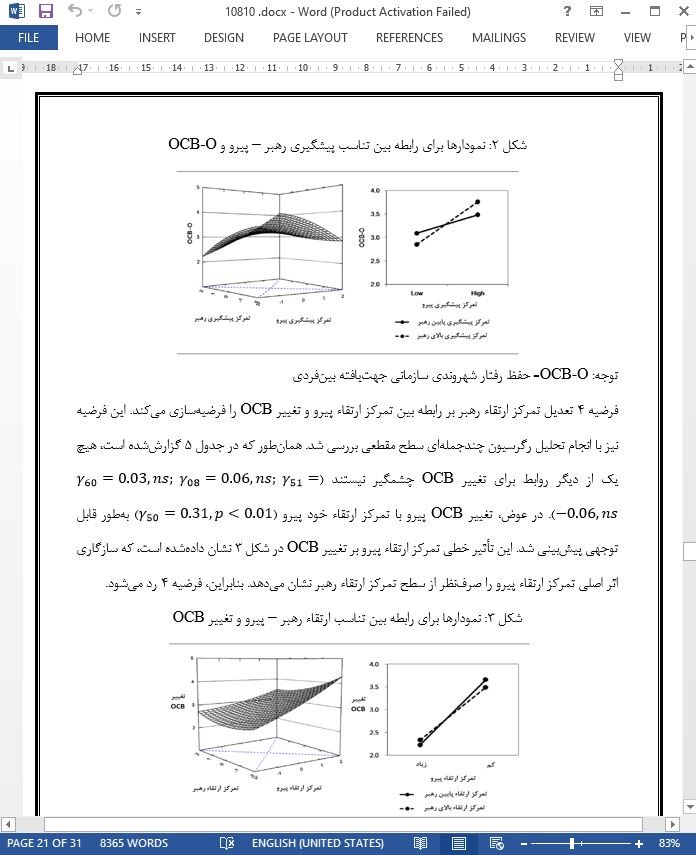
نقش تناسب نظارتی در رفتار شهروندی سازمانی پیروها
به دلیل افزایش تقاضا و رقابت سازمانی، فرایندهای نظارتی دستیابی به هدف کارکنان در رفتار کاری و بازده آنها بسیار محوری شده است. بر طبق نظریه تناسب نظارتی بین فردی، ما پیشنهاد میکنیم که تمرکز پیشگیری رهبر رابطه بین تمرکز پیشگیری پیرو و حفظ رفتار شهروندی سازمانی (OCB) را تعدیل میکند. بااینحال، رابطه بین تمرکز ارتقاء پیرو و تغییر رفتار شهروندی سازمانی با تمرکز ارتقاء رهبر نظارت خواهد شد. ما این فرضیههای تناسب را با استفاده از تحلیل رگرسیون چندجملهای سطح مقطع که روی 117 رهبر و 641 پیرو در شرکتهای کره جنوبی انجام شد، بررسی کردهایم. نتایج نشان میدهند که تمرکز پیشگیری پیروها ارتباط مثبتی با حفظ رفتار شهروندی سازمانی آنها دارد. هنگامیکه تمرکز پیشگیری رهبر بسیار بالا است، نسبت به زمانی که تمرکز پیشگیری کمتر است، این تأثیر اصلی بسیار برجستهتر شد. درحالیکه ما یک اثر اصلی چشمگیر از تمرکز ارتقاء پیرو بر تغییر رفتار شهروندی سازمانی کشف کردیم، اما هیچگونه اثر تناسب برای تمرکز ارتقاء مشاهده نشد. مفاهیم این یافتهها و همچنین مسیرهای آینده تحقیق در پایان مطرحشدهاند.
افزایش پیچیدگی و وابستگی متقابل وظایف در محیط کار نیازمند این است که کارکنان ورای وظایف شغل رسمی خود را انجام دهند. رفتار شهروندی سازمانی (OCB)، که به رفتار نقش اضافی اختیاری ورای توصیفات شغلی اشاره دارد، به عنوان عاملی در نظر گرفتهشده است که با حفظ و ارتقاء زمینه روانشناختی و اجتماعی سازمان در اثربخشی سازمانی آن مؤثر است (Borman & Motowildo, 1993; Organ, 1988). به همین دلیل، چندین مطالعه پیشزمینه و شرایط مرزی رفتار شهروندی سازمانی را بررسی کردهاند. بهطور خاص، تحقیقات مبتنی بر نظریه تناسب محیط - شخص (P-E) نشان داده است که وقتی مشخصات شخصی کارکنان با مشخصات محیط کاری آنها متجانس است، آنها تمایل به نمایش رفتار شهروندی سازمانی بیشتری دارند (Kristof, 1996; Kristof-Brown, Zimmerman, & Johnson, 2005). با لحاظ این جریان تحقیقی، ما نقش تناسب را به لحاظ تمرکز نظارتی در پیشبینی رفتار شهروندی سازمانی کارکنان بررسی کردیم. تمرکز نظارتی به جهتگیری استراتژیک فرد نسبت به نحوه تنظیم رفتار خود به منظور تلاش برای خروجیهای مطلوب اشاره دارد (Higgins, 1997). بر طبق نظریه تمرکز نظارتی (Higgins, 1997)، تمرکز ارتقاء یک جهتگیری استراتژیک است که شناخت و رفتار شخص نسبت به حصول خروجیهای مثبت را نظم میدهد، درحالیکه تمرکز پیشگیری به جهتگیری راهبردی نسبت به اجتناب از خروجیهای منفی مرتبط است.
محدودیتها و مسیرهای تحقیقات آینده
علیرغم مفاهیم عملی و نظری، مطالعه حاضر نیز محدودیتهایی دارد. ابتدا، در این مطالعه، OCB با گزارش کارکنان اندازهگیری شد. اگرچه ما شرایط مطلوب اجتماعی پاسخدهنده را در تمامی تحلیلهای داده کنترل کردیم، بااینحال هنوز احتمالاتی وجود دارد که دستهبندی OCB شرکتکنندهها متأثر از تعصبات ارزیاب باشد. تحقیق آینده میتواند این موضوع را با استفاده از درجهبندیهای شخص ثالث از OCB که از ناظران یا همتایان جمعآوری میشود، مورد بررسی قرار دهد. علاوه برآن، با توجه به کمبود تحقیق در زمینه تناسب نظارتی بینفردی و خروجیهای کار، محققان آینده نیاز به بررسی نقشهای مختلف تناسب پیشگیری و ارتقاء در خروجیهای کاری بسیار متفاوت، مانند عملکرد داخل نقش، خلاقیت و رفتار انحرافی هستند.
Due to increasing organizational demand and competition, employees’ goal-pursuit regulatory processes become pivotal to their work behavior and outcomes. Drawing on interpersonal regulatory fit theory, we proposed that leader prevention focus would moderate the relation between follower prevention focus and maintenance organizational citizenship behavior (OCB), whereas the relation between follower promotion focus and change OCB would be moderated by leader promotion focus. We tested these fit hypotheses using cross-level polynomial regression analyses conducted on 117 leader and 641 followers in South Korean firms. The results showed that followers’ prevention focus was positively associated with their maintenance OCB. This main effect was more pronounced when the leader’s prevention focus was high than when it was low. While we detected a significant main effect of follower promotion focus on change OCB, no fit effect was found for promotion focus. The implications of these findings as well as directions for future research are addressed.
The increasing complexity and interdependence of tasks in the workplace require employees to perform beyond their formal job duties. Organizational citizenship behavior (OCB), which refers to discretionary, extra-role behavior beyond job descriptions, has been considered a factor that can contribute to organizational effectiveness by maintaining and enhancing the organization’s social and psychological context (Borman & Motowildo, 1993; Organ, 1988). For this reason, a number of studies have explored the antecedents and boundary conditions of OCB. In particular, research grounded in person-environment (P-E) fit theory has shown that when employees’ own characteristics are congruent with those of their work environment, they tend to display more OCB (Kristof, 1996; Kristof-Brown, Zimmerman, & Johnson, 2005). Drawing on this stream of research, we attend to the role of fit in terms of regulatory focus in predicting employees’ OCB. Regulatory focus refers to an individual’s strategic orientation with respect to how to regulate his or her behavior to strive for desired outcomes (Higgins, 1997). According to regulatory focus theory (Higgins, 1997), promotion focus is a strategic orientation that regulates an individual’s cognition and behavior toward the achievement of positive outcomes, whereas prevention focus pertains to a strategic orientation toward the avoidance of negative outcomes.
Limitations and Directions for Future
Research In spite of its theoretical and practical implications, this study has some limitations. First, in this study, OCB was measured by employees’ self-report. Although we controlled for respondent’s social desirability in all data analyses, there is still some possibility that the participant ratings of OCB were affected by rater biases. Future research could address this issue by using third-party ratings of OCB collected from supervisors or peers. Moreover, given the dearth of research on interpersonal regulatory fit and work outcomes, future researchers may need to explore the differential roles of prevention and promotion fit in more diverse work outcomes, such as in-role performance, creativity, and deviant behavior

چکیده
مقدمه
پیشزمینه نظری و تحقیق
ایجاد فرضیه
ارتباط بین تمرکز نظارتی پیرو و رفتار شهروندی سازمانی (OCB)
ارتباط بین تناسب نظارتی رهبر – پیرو و رفتار شهروندی سازمانی (OCB)
روش
شیوه جمعآوری نمونه و داده
اقدامات
نتایج
بررسی فرضیه
بحث و بررسی
مفاهیمی برای نظریه و تحقیق
مفاهیمی برای اجرا
محدودیتها و مسیرهای تحقیقات آینده
توجه
Theoretical Background and Research
Hypothesis Development
Relationship Between Follower Regulatory Focus and OCB
Relationship Between Leader-Follower Regulatory Fit and OCB
Method
Sample and Data Collection Procedure
Measures
Results
Hypothesis Testing
Discussion
Implications for Theory and Research
Implications for Practice
Limitations and Directions for Future Research
Note
- اصل مقاله انگلیسی با فرمت ورد (word) با قابلیت ویرایش
- ترجمه فارسی مقاله با فرمت ورد (word) با قابلیت ویرایش، بدون آرم سایت ای ترجمه
- ترجمه فارسی مقاله با فرمت pdf، بدون آرم سایت ای ترجمه
